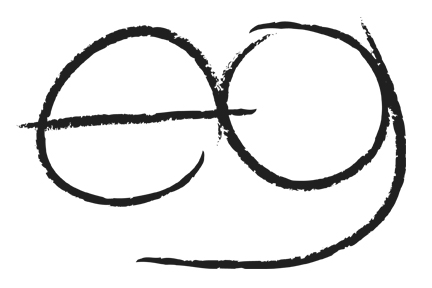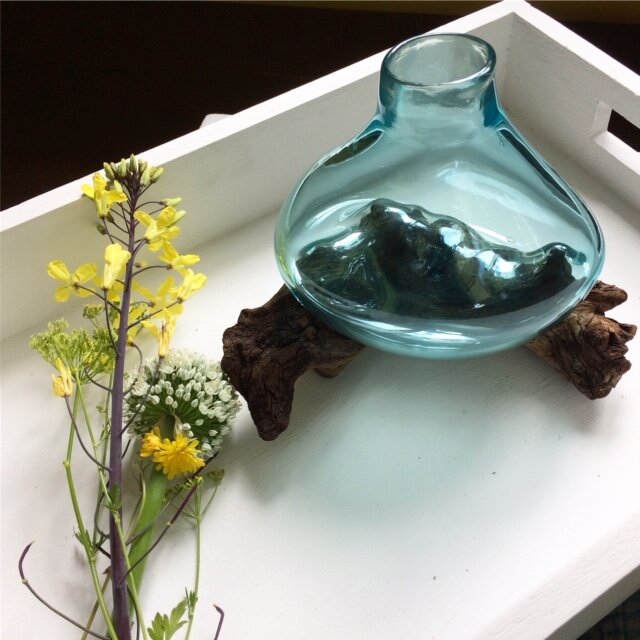Anyone who works with glass in the hot shop knows how important it is to have a great assistant who you work well with and Sonya Labrie was that for me when we were both studying at Sheridan College. People used to tease us because we almost always wore matching outfits but it was never planned. Sonya finds time to balance a busy schedule teaching in a high school while still making her glass work at the Terminal City Glass Co-op in Vancouver.
What does handmade mean to you?
To me, handmade means being involved in every step of the process of your work, from the design and inception of your idea to creating your work with your own hands. I would feel very lost if I contracted parts of my work out to others, I need to be in control of every aspect of the glass to be connected with my process.
How long have you been working in your chosen medium? Did you attend college or university to learn your craft?
I’ve been working with glass since the summer of 2005 when I attended my first glass blowing class at Red Deer College in Alberta. I loved it so much that in 2006 I took a huge leap and left my career in arts administration in British Columbia and moved to Ontario to pursue glass in the Crafts & Design program at Sheridan College. I had the opportunity to study glass at the renowned Pilchuck Glass School in Washington state. I have also taught glassblowing and flameworking classes at the Terminal City Class Co-op in Vancouver since 2012.
Tell me about your process. What would surprise people about your process? Is there a part of your process that you don't enjoy?
I work in a variety of glass techniques including glassblowing, flameworking and kiln casting. There a physicality to glass blowing: you're sweaty, you have calloused hands, you smell like smoke, and the end product is sometimes very delicate and fragile I love the intensity and the physical demands of the hot shop but also crave the time to be completely neurotic about small details in casting - it’s a fun balance and that is why I love glass as a medium. There are so many possibilities within the material with so many different techniques to explore.
It might surprise people to know how much work goes into the pieces outside of the hotshop. Cold working or cleaning beads means hand cramps because of bad circulation. I am also not a fan of being cold and I’m pretty much always cold so being in the cold shop is my least favourite part of the process by far. These are the not so glamorous parts of the glass process that happen behind the scenes that often no one sees.
What about your chosen medium(s) made you pursue your craft?
Sheer love! I learn something new every time I walk into the studio even after 15 years of working with glass. Between my full time teaching job and my own studio practice I am often working seven days a week and waking up at ungodly hours on the weekends to be at the co-op, but I wouldn’t have it any other way. I fall more in love with glass every day and I feel amazing every time I leave the shop to the point that it’s almost overwhelming.
If you could work in any other medium, what would it be?
Clay or metal casting. Definitely still something 3D, sculpted, and handmade.
What is the most important thing you want people to know about your work?
I love what I do and like most makers, I put a bit of my soul into my work. Recently I had a client of mine tell me that she wasn’t just buying a piece of glass from me, she was buying the energy that I put into it as well. When an artist is passionate about what they do, that is evident in their work.
What is your greatest accomplishment, or the thing you are most proud of achieving with your art?
I had a large part in developing Terminal City Glass Co-op, the co-operative studio in Vancouver where I make most of my work. I have been a key contributor to the educational curriculum development, I am deeply involved in community building practices, as well as being one of the instructors in several disciplines in glass.
In 2017, I graduated from the University of British Columbia in Vancouver, BC with a Bachelor of Education Degree in Secondary Technology Education & Art, with highest distinctions of the Dean’s Educational Scholarship. With this degree I have pursued the love I have for sharing craft with others by becoming an Applied Design, Skills, and Technologies (ADST) educator with the Vancouver School Board. Having an active studio practice is important as an educator because I act as a role model to the students who may one day pursue their own career in the arts. I advocate for creativity and originality and encourage my students to reflect about the process of making, how that can inform their relationship with handmade, and highlighting why it’s important. My thoughts on handmade are woven throughout my pedagogy.
What has been your biggest challenge while pursuing your art?
Space! It’s so expensive to rent studio space in Vancouver, and glassblowing is incredibly cost prohibitive. I am extremely lucky to have the co-op where I am able to share a space with 200+ members.
Has the confusion surrounding the term "handmade" affected your business/practice? What are your thoughts on re-sellers?
There’s a time and place for everything and everyone - I find that I have to do a lot of research before participating in a show to see if it’s a good match for me and my business. I have come to realize that some shows offer a mix of handmade and “assembled or kit” crafts, and my business thrives at shows that prioritize depth of craft. Audiences at these shows tend to be more educated about handmade and have an easier time differentiating between what is authentically handmade and what has been assembled or pre-purchased to be re-sold.
How do you (and how can we) educate consumers about what handmade actually means?
I am always talking about my process whether it be on my social media channels, when I am in the studio making or teaching, or when I am selling my work at a craft show. All the products I offer have been imagined, prototyped and then made so I highlight this whenever I can.
How has being an artist changed the way you shop?
I shop local and at a lot of the local art and craft markets that I participate in. This also spills over to my food as well. I try to buy as much locally grown food and fresh farm products as I can or at the very least will try and shop at smaller independent grocers. I also choose family run restaurants over large chains.
Who are your favourite makers?
Oh the list! We have such a wealth of amazing makers! I could have divided them into sub categories, BUT since March is Women's History Month and Sunday was International Women’s Day, I'm only going to list a few of my favorite ladies (local and alive!) and in no specific order since I love them all: Holly Cruise , Elen Danielle, Arleigh Wood , Bridget Catchpole, Jennifer Blair, Lana Lepper Adea Chung, Heather Dahl, Julie Morrison, Emi Fugita, and my work wife Tara Pawson.






